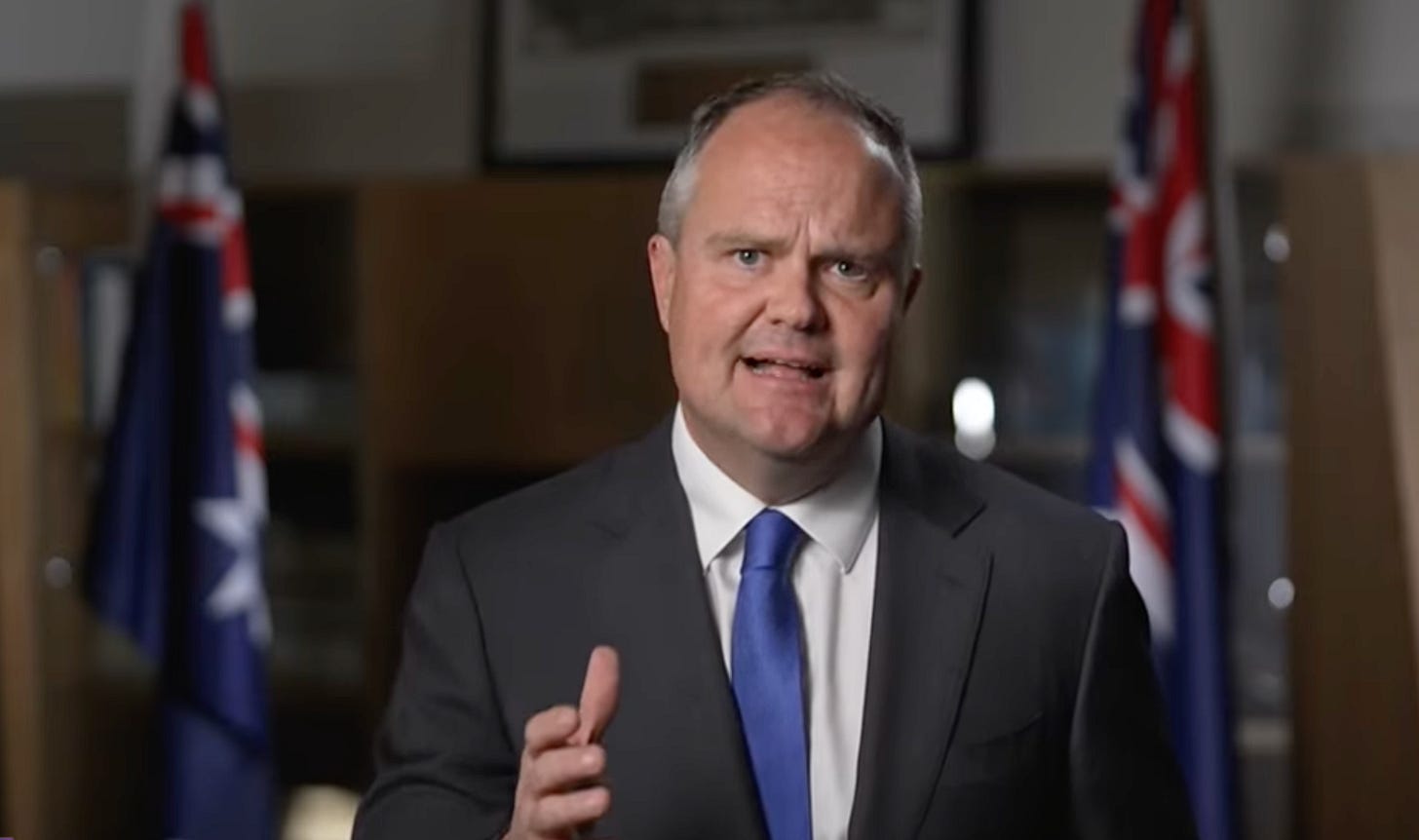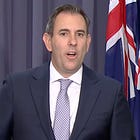Shadow Treasurer Claims Government Missed $12 Billion Surplus Opportunity
Today’s Article is brought to you by Empower your podcasting vision with a suite of creative solutions at your fingertips.
This piece is freely available to read. Become a paid subscriber today and help keep Mencari News financially afloat so that we can continue to pay our writers for their insight and expertise.
Shadow Treasurer Ted O’Brien accused the government of squandering a potential $12 billion surplus, claiming $22 billion in spending decisions without offsetting savings transformed what could have been a healthy surplus into the $10 billion deficit announced today.
Speaking on ABC’s 7.30, O’Brien said the government received “probably the largest windfall in revenue any government has received in its history” but failed to use it for debt reduction, instead adding approximately $100 billion to national debt heading toward $1.2 trillion by the next election.
“The announcement today was on last financial year’s budget. The government had in there $22 billion of additional decisions it made. Instead of finding offset savings in the budget to pay for those priorities, it just decided to spend more money,” O’Brien said. “They could have delivered a $12 billion surplus.”
The shadow treasurer’s remarks intensified opposition criticism of Treasurer Jim Chalmers’ economic management, directly challenging the government’s narrative that responsible budgeting delivered the better-than-forecast result.
Truth matters. Quality journalism costs.
Your subscription to Mencari directly funds the investigative reporting our democracy needs. For less than a coffee per week, you enable our journalists to uncover stories that powerful interests would rather keep hidden. There is no corporate influence involved. No compromises. Just honest journalism when we need it most.
Not ready to be paid subscribe, but appreciate the newsletter ? Grab us a beer or snag the exclusive ad spot at the top of next week's newsletter.
Decade of Deficits Warning
O’Brien warned the government planned another decade of deficits, with a $42 billion deficit forecast for the current financial year, $37 billion of which he attributed to government decisions without corresponding savings.
“Our message today to the Treasurer is that he announced today a deficit that should have been a surplus. And he is now planning another decade of deficits ahead,” O’Brien said. “There’s one thing the government needs to do, and that is to stop the spending spree.”
The shadow treasurer said the government put “its hand in the cookie jar and started spending and baking in more spending for the future” rather than using revenue to reduce debt.
Electric Vehicle Tax Criticism
When pressed by interviewer Sarah Ferguson for specific spending measures he would roll back or cancel, O’Brien initially resisted providing details before offering electric vehicle fringe benefits tax exemptions as a prime example of poor policy.
“Every government is entitled to decide what its priorities of spending are. They are then responsible for financing those priorities. The point I made today is that the government has failed to finance for its own priorities,” O’Brien said. “It’s not for the government to determine its spending priorities and for the opposition to go and find the savings to offset them. That is entirely the job of the government.”
O’Brien said the EV tax policy was costing 13 times more than budgeted and created inequitable outcomes. “It means that a nurse who is on $90,000 will pay more money to lease an EV than a lawyer on $200,000. Why? The taxpayer is picking up the bill,” he said. “This is inequitable. It is unfair. And it is the most expensive way to reduce emissions.”
Fiscal Rules Proposal
When Ferguson asked about opposition leader Sussan Ley’s recent economic speech advocating restraint on “big government” and whether specific areas like childcare, medicines or NDIS were targets, O’Brien pivoted to fiscal rules rather than identifying programs.
“What we’re looking at first and foremost, Sarah, is to introduce a series of rules to control spending in the budget. Now, ever since the Hawke government, every single Treasurer has had to work within parameters, within rules, except Jim Chalmers,” O’Brien said.
He claimed the opposition’s position aligned with prominent economists including Ken Henry. “Jim Chalmers needs to introduce fiscal rules to control his spending spree. It’s only the Labor government which believes it doesn’t need to control its spending. Everyone else is saying it should,” he said.
When Ferguson noted O’Brien was “prepared to make demands from the sidelines, but you’re not willing to offer up any detail,” the shadow treasurer defended previous coalition and Labor governments for maintaining such rules.
Independent Optus Inquiry Demanded
O’Brien called for an independent inquiry into the Optus triple zero failures rather than relying on regulator ACMA, citing lives lost and community anxiety.
“We’re talking here not just about an emergency services number, but probably the single most important phone number Australians need to have at hand, triple zero. And we’re talking about lives that are being lost. We’re talking about delays in getting to hospital. We’re talking about heightened anxiety among the Australian community,” O’Brien said.
He criticized Communications Minister Annika Wells for traveling overseas following the incidents. “We have seen these lives lost over just the last few days. The minister fly off overseas. We need to have urgent action here,” he said.
O’Brien argued the regulator could not investigate itself. “You can’t have the regulator itself participating in that unless they’re just giving evidence and providing advice. They can’t run the show. And that is because they themselves have questions to answer. You cannot do an investigation into yourself. That’s the simple premise of our argument,” he said.
Leadership Questions Deflected
When Ferguson raised questions about challenges to Ley’s authority and compared Andrew Hastie’s social media activity to Tony Abbott’s pre-leadership book “Battle Lines,” O’Brien rejected the comparison and defended internal party debate.
“I reject that comparison, Sarah,” O’Brien said. “The Liberal Party does it in a very different way from the Labor Party. We believe in freedom of speech. We believe in every single member having a say. We have robust debate.”
He contrasted Liberal and Labor party cultures. “Under the Labor Party’s rules, you shut up. You do as you’re told. That is why you never see Labor MPs out there doing what Liberal MPs do, speaking their mind, robust debate,” O’Brien said. “This is why, Sarah, I believe it’s only the Liberal Party that ends up with good government policy, because we test it, and we’re not afraid of doing so.”
When Ferguson noted Hastie called colleagues who criticized his posts “nameless cowards and muppets,” O’Brien defended his colleague. “Andrew Hastie and every single one of my colleagues are out there right now engaging with the Australian public, and they are debating the issues that matter to Australians, and they do so under Susan’s leadership,” he said.
O’Brien cited Ley’s stated approach upon taking leadership. “And that is the need for us to listen, the need for us to debate, and we’ll take our time to get policy right. And every member can have their say,” he said. “I’m in no way defensive of that. In fact, I think it is a strength of the Liberal Party. I really do.”
Car Industry Question Avoided
When Ferguson asked whether Hastie was correct in claiming both parties erred by letting the car industry disappear, O’Brien repeatedly declined direct engagement with the specific question.
“I saw Andrew’s post on that, and that was part of a bigger message, I thought. It’s a message a lot of us have carried over the years,” O’Brien initially responded.
After Ferguson pressed for a “simple question about the car industry,” O’Brien pivoted to broader themes. “The future that I want to see for Australia is one where we are rich, we are strong, and we are fiercely independent. That requires cheap energy costs,” he said.
When Ferguson suggested the “robust debate” didn’t extend to car industry discussion, O’Brien defended his approach. “What this means is we need to ensure that we have the settings right as a government to allow manufacturing to flourish. As a Liberal, I don’t believe it’s the role of government to dictate exactly what sector should be doing what. That’s Labor’s game,” he said.
O’Brien outlined a framework-focused approach. “What we believe in is ensuring that we get the framework right, the environment right. And what does that mean? It means lower, simpler taxes. It means cheap, clean energy. It means ensuring that businesses have the opportunity to flourish,” he said.
Manufacturing and Sovereign Capability
O’Brien connected Hastie’s car industry comments to broader sovereign capability concerns, linking multiple policy areas under energy cost reduction.
“And that is the importance of Australia having sovereign capability in key areas. And unless we do address things like our energy costs, something that Susan Lee, Andrew Hastie, me and others have all been talking about, unless that happens, we will see sovereign capability going from our shores,” he said.
The shadow treasurer characterized the government’s approach as interventionist compared to Liberal philosophy. “Things that the Labor Party are not interested in and things that the Liberal Party are united over,” he said.
Budget Context
O’Brien’s appearance followed Chalmers’ announcement of the $10 billion deficit for 2024-25, substantially lower than the $28 billion Treasury forecast at the election. The government characterized the result as vindication of responsible economic management and the largest budget improvement in a single parliamentary term.
The opposition’s attack centered on claims the government benefited from revenue windfalls rather than disciplined management, setting up continuing debate over fiscal responsibility as both parties position for future budget announcements.
O’Brien maintained the government failed its fundamental responsibility to finance spending priorities through offsetting savings, while defending the opposition’s right to debate policy directions without providing comprehensive alternative budgets early in the parliamentary term.
The exchange highlighted tensions between demands for opposition policy detail and the shadow treasurer’s insistence that governments bear responsibility for financing their own priorities, a dynamic likely to continue as the opposition develops detailed alternative policies ahead of the next election.
Sustaining Mencari Requires Your Support
Independent journalism costs money. Help us continue delivering in-depth investigations and unfiltered commentary on the world's real stories. Your financial contribution enables thorough investigative work and thoughtful analysis, all supported by a dedicated community committed to accuracy and transparency.
Subscribe today to unlock our full archive of investigative reporting and fearless analysis. Subscribing to independent media outlets represents more than just information consumption—it embodies a commitment to factual reporting.
As well as knowing you’re keeping Mencari (Australia) alive, you’ll also get:
Get breaking news AS IT HAPPENS - Gain instant access to our real-time coverage and analysis when major stories break, keeping you ahead of the curve
Unlock our COMPLETE content library - Enjoy unlimited access to every newsletter, podcast episode, and exclusive archive—all seamlessly available in your favorite podcast apps.
Join the conversation that matters - Be part of our vibrant community with full commenting privileges on all content, directly supporting The Evening Post (Australia)
Catch up on some of Mencari’s recent stories:
It only takes a minute to help us investigate fearlessly and expose lies and wrongdoing to hold power accountable. Thanks!








